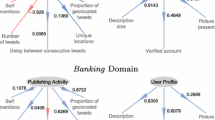Abstract
We investigate the differences between how some of the fundamental principles of network formation apply among offline friends and how they apply among online friends on Twitter. We consider three fundamental principles of network formation proposed by Schaefer et al.: reciprocity, popularity, and triadic closure. Overall, we discover that these principles mainly apply to offline friends on Twitter. Based on how these principles apply to offline versus online friends, we formulate rules to predict offline friendship on Twitter. We compare our algorithm with popular machine learning algorithms and Xiewei’s random walk algorithm. Our algorithm beats the machine learning algorithms on average by 15 % in terms of f-score. Although our algorithm loses 6 % to Xiewei’s random walk algorithm in terms of f-score, it still performs well (f-score above 70 %), and it reduces prediction time complexity from \(O(n^2)\) to O(n).
Access this chapter
Tax calculation will be finalised at checkout
Purchases are for personal use only
Similar content being viewed by others
References
Adler, P.A., Kless, S.J., Adler, P.: Socialization to gender roles: popularity among elementary school boys and girls. Sociol. Educ. 65(3), 169–187 (1992)
Barabási, A.-L., Albert, R.: Emergence of scaling in random networks. Science 286(5439), 509–512 (1999)
Boyd, D.M., Ellison, N.B.: Social network sites: definition, history, and scholarship. J. Comput. Mediated Commun. 13(1), 210–230 (2007)
Coie, J.D., Dodge, K.A.: Continuities and changes in children’s social status: a five-year longitudinal study. Merrill-Palmer Q. 29, 261–282 (1983)
Ellison, N.B., Steinfield, C., Lampe, C.: The benefits of Facebook friends: social capital and college students use of online social network sites. J. Comput. Mediated Commun. 12(4), 1143–1168 (2007)
Ghosh, S., Viswanath, B., Kooti, F., Sharma, N.K., Korlam, G., Benevenuto, F., Ganguly, N., Gummad, K.P.: Understanding and combating link farming in the twitter social network. In: WWW 2012 Proceedings of the 21st international conference on World Wide Web, pp. 61–70. ACM (2012)
Golder, S., Yardi, S.: Structural predictors of tie formation in twitter: transitivity and mutuality. In: 2010 IEEE Second International Conference on Social Computing (SocialCom), pp. 88–95. IEEE (2010)
Gouldner, A.W.: The norm of reciprocity: a preliminary statement. Am. Sociol. Rev. 25(2), 161–178 (1960)
Kwak, H., Lee, C., Park, H., Moon, S.: What is twitter, a social network or a news media? In: WWW 2010 Proceedings of the 19th International Conference on World Wide Web, pp. 591–600. ACM (2010)
Laursen, B., Hartup, W.W.: The origins of reciprocity and social exchange in friendships. New Dir. Child Adolesc. Dev. 2002(95), 27–40 (2002)
Leskovec, J., Backstrom, L., Kumar, R., Tomkins, A.: Microscopic evolution of social networks. In: KDD 2008 Proceedings of the 14th ACM SIGKDD International Conference on Knowledge Discovery and Data Mining, pp. 462–470. ACM (2008)
Newman, M.E.J.: The structure and function of complex networks. Soc. Ind. Appl. Math. (SIAM) Rev. 45(2), 167–256 (2003)
Price, D.D.S.: A general theory of bibliometric and other cumulative advantage processes. J. Am. Soc. Inf. Sci. 27(5), 292–306 (1976)
Schaefer, D.R., Light, J.M., Fabes, R.A., Hanish, L.D., Martin, C.L.: Fundamental principles of network formation among preschool children. Soc. Netw. 32, 61–71 (2010)
Snijders, T.A.B.: The statistical evaluation of social network dynamics. Sociol. Methodol. 31(1), 361–395 (2001)
Snijders, T.A.: Statistical models for social networks. Ann. Rev. Sociol. 37, 131–153, 469 (2011)
Xie, W., Li, C., Zhu, F., Lim, E., Gong, X.: When a friend in twitter is a friend in life. In: WebSci 2012 Proceedings of the 4th Annual ACM Web Science Conference, pp. 344–347. ACM (2012)
Acknowledgment
This research is supported by the Singapore National Research Foundation under its International Research Centre @ Singapore Funding Initiative and administered by the IDM Programme Office, Media Development Authority(MDA). It is also partly supported by Pinnacle Lab at Singapore Management University(SMU).
Author information
Authors and Affiliations
Corresponding author
Editor information
Editors and Affiliations
Rights and permissions
Copyright information
© 2016 Springer International Publishing Switzerland
About this paper
Cite this paper
Natali, F., Zhu, F. (2016). A Comparison of Fundamental Network Formation Principles Between Offline and Online Friends on Twitter. In: Wierzbicki, A., Brandes, U., Schweitzer, F., Pedreschi, D. (eds) Advances in Network Science. NetSci-X 2016. Lecture Notes in Computer Science(), vol 9564. Springer, Cham. https://doi.org/10.1007/978-3-319-28361-6_14
Download citation
DOI: https://doi.org/10.1007/978-3-319-28361-6_14
Published:
Publisher Name: Springer, Cham
Print ISBN: 978-3-319-28360-9
Online ISBN: 978-3-319-28361-6
eBook Packages: Computer ScienceComputer Science (R0)




